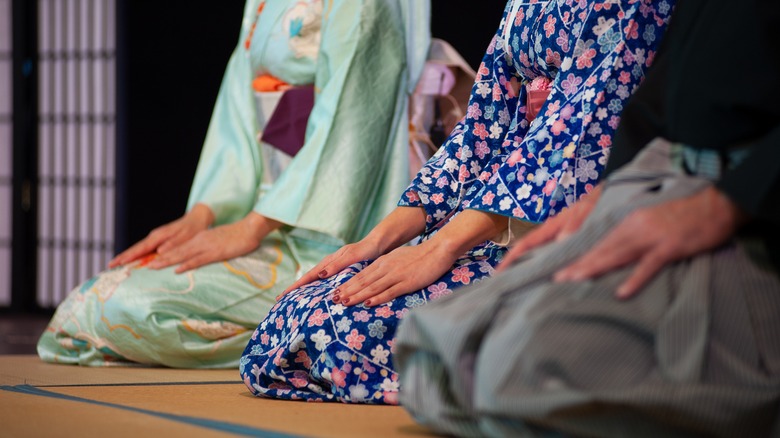The Common Hand Signal In The US Considered Rude In Japan (And What To Do Instead)
When traveling to a new destination, one of the most important things you can do in order to avoid any mishaps or cultural faux pas is to get acquainted with the local customs. From understanding money practices in countries like Thailand to learning the ropes in order to avoid being considered an annoying tourist while visiting Europe, knowing what to say and how to behave can make the difference between a great experience and getting some pretty nasty looks from locals.
With that in mind, one of the most popular travel destinations where doing your research and looking into the local culture and behaviors can help you avoid embarrassment is Japan. This, especially when it comes to body language and gestures that might seem and feel common in the United States ... but actually end up having an entirely different meaning once you land in the island country.
Specifically, one of these gestures is the seemingly innocuous act of pointing. While stateside, pointing doesn't mean much beyond trying to indicate a direction or draw attention to something, the Japanese actually consider it incredibly impolite — and it's especially offensive if you're doing it while referring to a person.
The art of (not) pointing in Japan
What's so problematic about pointing in Japan? According to locals, pointing at someone is typically reserved for heated confrontations — especially when one person is trying to call out the other for doing something wrong. Consequently, the act of pointing is directly associated with being angry, hostile, or accusatory — three emotions you definitely don't want to be conveying anywhere you go. As a result, this ultimately means that locals might find it a little jarring when they see someone do it so casually.
So, what happens if you need to indicate a direction or refer to something in Japan and pointing is a big no-go? Well, the easiest way to avoid offending anyone — and still get your message across — is to use an open hand instead of just your index finger. Then, simply gesture in the general direction of what you're referring to and you should be good to go. Alternatively, gesturing with your head is also acceptable.
At the end of the day, the small adjustment of trading up finger-pointing for open-handed gestures is considered a much more polite and respectful way to draw attention to something or someone. Plus, it doesn't raise any eyebrows or cause unintended offense — both of which you'll (ideally) want while being a guest in someone else's country.
Other behaviors to keep in mind during your visit to Japan
Along with not pointing, there are plenty of other customs that travelers will want to keep in mind in order to be a considerate tourist in Japan and avoid offending anyone during their visit. For starters, there's the issue with handshakes. While most Western travelers might find it normal to immediately reach out and shake someone's hand after meeting them, the truth is that you'll actually want to avoid this common greeting while traveling to Japan and opt for a simple head nod or slight bow instead.
Another great tip is to remember the fact that showing the soles of your feet to someone is also considered disrespectful. This is particularly important while sitting on the floor in traditional settings — think temples or local restaurants. That said, you'll typically want to tuck your legs directly underneath you — this is called the "seiza position" — or cross them fully.
As a final note, there's the importance of personal space. In Japan, people generally maintain a larger personal bubble. This usually means avoiding unnecessary physical contact (hence trading up a handshake for a nod/bow), keeping a respectful distance when talking to someone — especially if they're a stranger — and even being mindful of others while navigating crowded areas. At the end of the day, being aware of these subtle cultural nuances won't just help you avoid awkward situations, it'll also help you show respect — which can lead to a more enriching experience overall.


